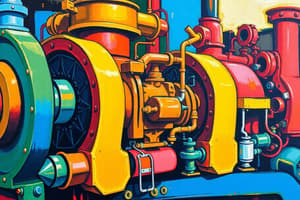Podcast
Questions and Answers
What is one of the primary tasks of marine boilers mentioned in the text?
What is one of the primary tasks of marine boilers mentioned in the text?
- Cooling down the ship's equipment
- Providing steam for main engine operation
- Producing electricity for the ship
- Heating fuel oil for appropriate viscosity (correct)
Why is it essential to keep fuel oil at an appropriate viscosity on ships?
Why is it essential to keep fuel oil at an appropriate viscosity on ships?
- To maintain the proper functioning of the ship's equipment and safety (correct)
- To ensure smooth sailing in rough weather conditions
- To reduce the weight of the ship
- To prevent corrosion of the ship's hull
What is the purpose of heating coils in marine auxiliary boilers?
What is the purpose of heating coils in marine auxiliary boilers?
- To cool down fuel oil in storage tanks
- To produce electricity for the ship
- To heat water for crew consumption
- To maintain the viscosity of heavy fuel oil (correct)
Which system is directly connected to the main engine on a ship?
Which system is directly connected to the main engine on a ship?
What happens if the viscosity of heavy fuel oil drops too low?
What happens if the viscosity of heavy fuel oil drops too low?
How are marine auxiliary boilers utilized in relation to the main engine?
How are marine auxiliary boilers utilized in relation to the main engine?
What is one of the factors involved in calculating the steam flow rate required to maintain the temperature of the fuel in the HFO storage tanks?
What is one of the factors involved in calculating the steam flow rate required to maintain the temperature of the fuel in the HFO storage tanks?
Why is the choice of marine boiler critical during the design phase of a ship?
Why is the choice of marine boiler critical during the design phase of a ship?
What role do auxiliary boilers play in maintaining the desired temperature in HFO storage tanks?
What role do auxiliary boilers play in maintaining the desired temperature in HFO storage tanks?
Why must designers ensure that the steam output obtained from marine boilers exceeds the required steam flow rates?
Why must designers ensure that the steam output obtained from marine boilers exceeds the required steam flow rates?
What is a key consideration when selecting auxiliary boilers for a ship?
What is a key consideration when selecting auxiliary boilers for a ship?
How do heating coils contribute to the overall performance of a ship?
How do heating coils contribute to the overall performance of a ship?
Flashcards are hidden until you start studying
Study Notes
Marine Boiler Functions: Heating of Fuel Oil
In a marine environment, marine boilers play a crucial role in supporting various operations and machinery onboard ships, particularly when it comes to auxiliary functions. One of the primary tasks of these boilers is to heat fuel oil, ensuring it remains at an appropriate viscosity for ease of transfer and usage. This is essential for maintaining the proper functioning of the ship's equipment and safety.

Understanding Marine Auxiliary Boilers
Marine auxiliary boilers are primarily used for heating purposes and serve as support systems for the main engine. These boilers are not directly connected to the main engine but are employed for specific applications like heating fuel oil or providing steam for various secondary services onboard ships.
Functioning of Heating Coils in Boilers
One of the key components of marine auxiliary boilers is the heating coil, which is used to maintain the viscosity of heavy fuel oil (HFO) in storage tanks. HFO is a thick substance that becomes difficult to handle if its viscosity drops too low, leading to difficulties in its transfer between tanks. Therefore, auxiliary boilers are used to produce steam, which is subsequently circulated through the heating coils in fuel oil storage tanks to keep the oil at an optimal temperature for handling.
Technical Details and Calculations
To ensure that the desired temperature is maintained in the HFO storage tanks, the heating fluid in the heating coils is typically produced via the auxiliary boiler. By calculating the heat loss from the tank bulkhead, the steam flow rate required to maintain the temperature of the fuel can be determined. This calculation involves factors such as the overall heat transfer coefficient, the area of the tank bulkhead, and the temperatures of both the tank and the adjacent medium.
The choice of marine boiler is critical during the design phase of a ship. Auxiliary boilers need to be selected carefully based on their ability to meet specific steam output requirements. This includes considerations for steam consumption necessary to compensate for heat losses in the tanks, raise the temperature of fuel oil, and fulfill other service demands.
While choosing a marine boiler, designers must ensure that the steam output obtained from the boiler exceeds the required steam flow rates at various working pressures and feed water temperatures, taking into account different sailing conditions.
Conclusion
By understanding the intricacies of marine boiler functions, specifically the heating of fuel oil, it becomes evident that the success of a ship's operations relies heavily on these complex yet vital systems. Ensuring that fuel oil maintains its correct viscosity through the use of auxiliary boilers and heating coils enables smooth and efficient transfer of fuel, ultimately contributing to the overall performance of the ship.
Studying That Suits You
Use AI to generate personalized quizzes and flashcards to suit your learning preferences.




